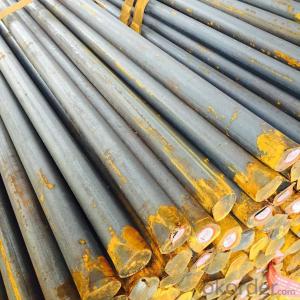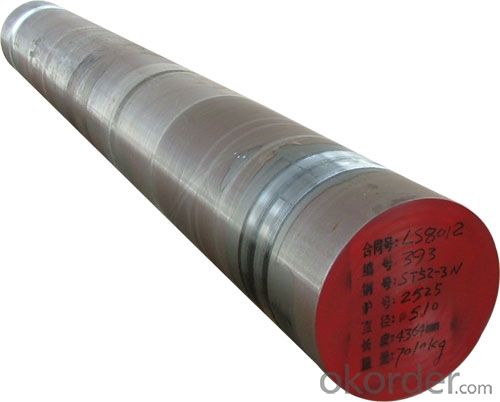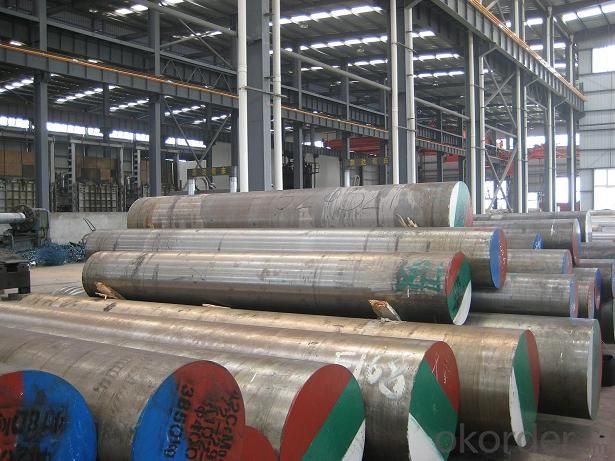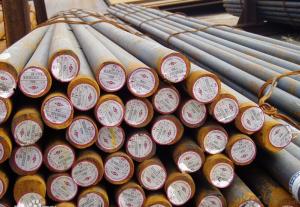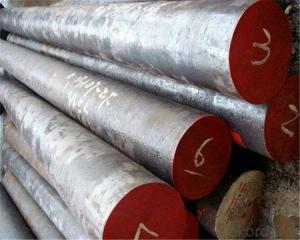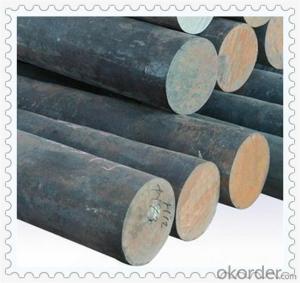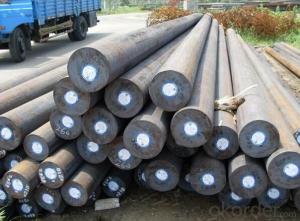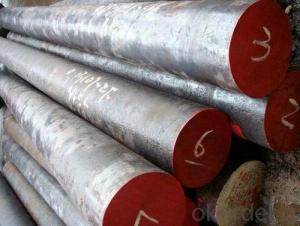4140 Alloy Steel, 1.7225 Steel Material, SCM440 Steel Bar
- Loading Port:
- China main port
- Payment Terms:
- TT OR LC
- Min Order Qty:
- 30 m.t.
- Supply Capability:
- 10000 m.t./month
OKorder Service Pledge
OKorder Financial Service
You Might Also Like
Specification
4140 Alloy Steel, 1.7225 Steel Material, SCM440 Steel Bar
Product information:
1. Dia:12mm-300mm
2. Standard Performed: ASTM A29/A29M-04
Equal Standard:
America Standard: AISI4140
International Standard: 42CrMo4
Japan Standard: SCM440
Germany Standard: 42CrMo4
4.Grade:ASTM A29 4140 42CrMo SCM440
Hardness:217HB
Tensile strength:1080(110)MPA
Yield strength: 930(95)MPA
elogation:12% Reduction of area:45% AKV(impact value):63J
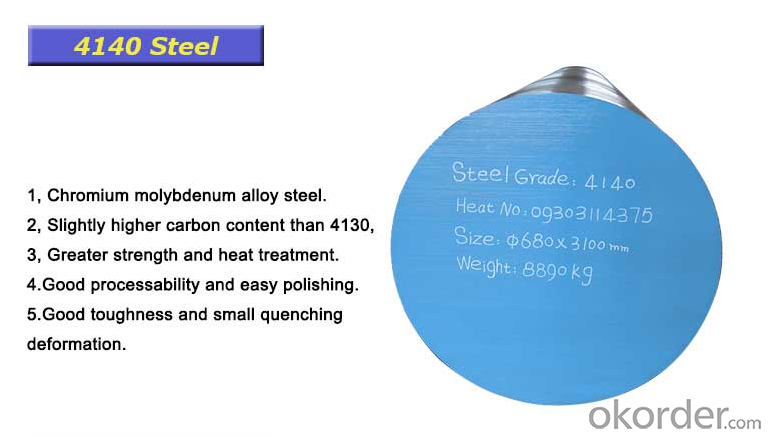
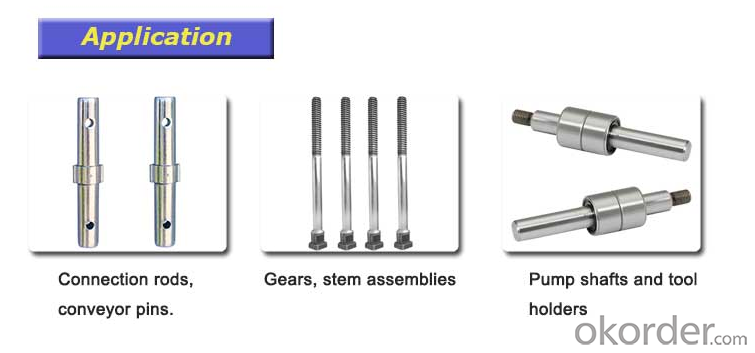
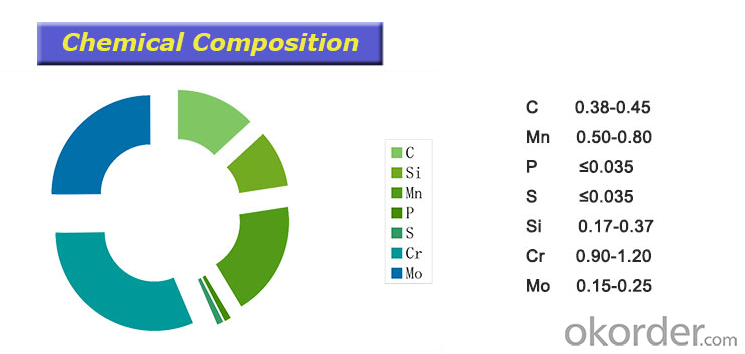
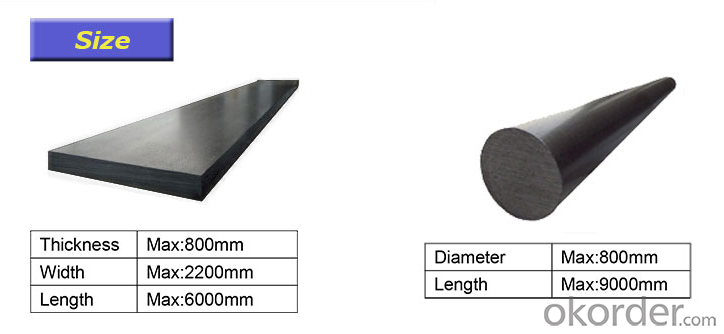

Product show:
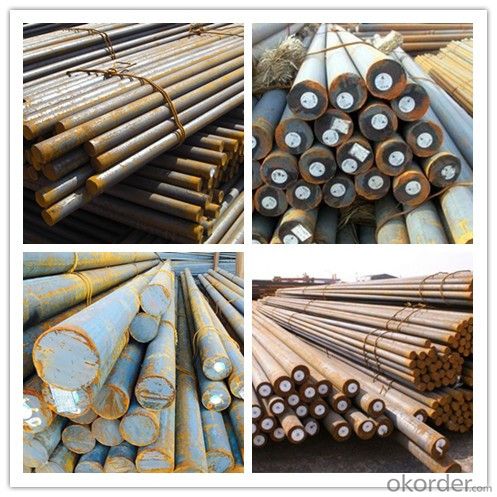
Workshop show:
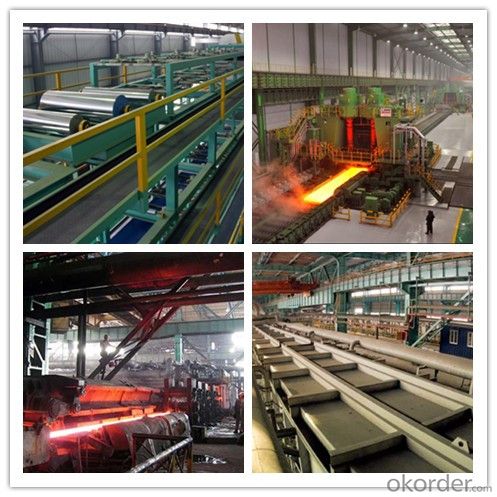
Our service:
-High manufacturing accuracy
-High strength
-Small inertia resistance
-Strong heat dissipation ability
-Good visual effect
-Reasonable price
Chose happens because of quality, then price, We can give you both.Additionally, we can also offer professional products inquiry, products knowledge train(for agents), smooth goods delivery, exellent customer solution proposals.Our service formula: good quality+good price+good service=customer's trust
SGS test is available, customer inspection before shipping is welcome, third party inspection is no problem.
If you need the sample, please feel free to let me know. Any question, we will contact you ASAP!
- Q: How does special steel contribute to the waste management industry?
- Special steel contributes to the waste management industry in various ways. Its exceptional strength, durability, and resistance to corrosion make it ideal for manufacturing equipment used in waste management processes. Special steel is extensively used in the construction of waste sorting systems, recycling machinery, and waste containers, ensuring their longevity and reliability. Additionally, special steel can be recycled itself, reducing the environmental impact of waste management operations and promoting sustainability in the industry.
- Q: How does special steel enhance the performance of cutting tools?
- Special steel enhances the performance of cutting tools in several ways. Firstly, special steel is designed to have a higher hardness and wear resistance compared to standard steel. This increased hardness allows cutting tools to maintain their sharpness for a longer period, resulting in improved cutting efficiency and accuracy. Additionally, the high wear resistance of special steel ensures that the cutting edges of the tools do not wear down quickly, enabling them to withstand the high forces and pressures involved in cutting operations. Furthermore, special steel often has superior toughness and strength compared to regular steel. This enhanced toughness allows cutting tools to withstand impacts and vibrations without breaking or chipping, ensuring their durability and longevity. The increased strength of special steel also enables cutting tools to handle higher cutting speeds and feed rates, thereby improving productivity and reducing machining time. Special steel also offers excellent heat resistance properties, which is crucial for cutting tools that are subjected to high temperatures during machining processes. This heat resistance prevents the cutting edges from becoming soft or deforming, which can result in poor cutting performance and reduced tool life. Additionally, special steels can have improved corrosion resistance, preventing the tools from rusting or corroding when exposed to moisture or aggressive cutting fluids. In summary, the unique properties of special steel, including higher hardness, wear resistance, toughness, strength, heat resistance, and corrosion resistance, all contribute to enhancing the performance of cutting tools. These characteristics enable cutting tools to maintain their sharpness, withstand high forces and temperatures, resist wear and corrosion, and ultimately, improve cutting efficiency, accuracy, and tool life.
- Q: What are the different methods of improving the corrosion resistance of special steel?
- Improving the corrosion resistance of special steel can be accomplished through several available methods. Some commonly utilized techniques include: 1. Alloying: Enhancing corrosion resistance can be effectively achieved by alloying the steel with specific elements. For instance, the addition of chromium forms a protective chromium oxide layer on the surface, acting as a barrier against corrosion. Other elements such as molybdenum, nickel, and copper can also be incorporated to enhance corrosion resistance. 2. Surface treatments: Various surface treatments can be employed to augment the steel's corrosion resistance. Galvanizing, for example, involves coating the steel with a layer of zinc, providing protection against corrosion. Another method, electroplating, deposits a thin layer of a more corrosion-resistant metal like nickel or chromium onto the steel surface. 3. Passivation: Passivation is a chemical process that eliminates free iron and other contaminants from the steel surface, resulting in the creation of a passive film that aids in corrosion resistance. This method is frequently used for stainless steel, in which a thin layer of chromium oxide is formed by treating the steel with an oxidizing agent such as nitric acid. 4. Protective coatings: The application of protective coatings on the steel surface significantly enhances its corrosion resistance. Various types of coatings, such as paints, epoxy coatings, and ceramic coatings, act as a barrier between the steel and the corrosive environment, preventing direct contact and corrosion. 5. Heat treatment: Heat treatment techniques, including annealing, quenching, and tempering, can alter the steel's microstructure, thereby enhancing its corrosion resistance. Heat treatment improves the steel's mechanical properties, reduces residual stresses, and eliminates impurities, all of which contribute to better corrosion resistance. 6. Design considerations: Proper design and construction techniques play a crucial role in improving the corrosion resistance of special steel. For instance, the elimination of sharp corners and crevices, the use of appropriate drainage systems, and ensuring proper ventilation can prevent the accumulation of moisture and corrosive agents. It is important to note that the selection of the most suitable method depends on the specific application, environment, and desired level of corrosion resistance. Optimal results can often be achieved by employing a combination of these methods.
- Q: Can special steel be used in the renewable energy sector?
- Yes, special steel can be used in the renewable energy sector. Special steel, also known as alloy steel, offers enhanced properties such as high strength, durability, and corrosion resistance, making it suitable for various applications in renewable energy technologies. In wind energy, special steel is utilized for manufacturing wind turbine components. Wind turbine towers require strong and lightweight materials to withstand the dynamic loads and harsh environmental conditions. Special steel alloys, such as high-strength low-alloy (HSLA) steel, provide the necessary strength-to-weight ratio, ensuring the structural integrity of wind turbine towers. Solar energy systems also benefit from special steel. Concentrated solar power (CSP) plants utilize mirrors or lenses to focus sunlight, generating intense heat for electricity generation. Special steel alloys with high thermal conductivity and resistance to high temperatures are used in the construction of these components, ensuring efficient energy capture and durability. Moreover, special steel is employed in the manufacturing of hydroelectric power generation equipment. Turbine components, such as blades, shafts, and runners, require materials with high strength and resistance to erosion and cavitation. Special steel alloys, such as stainless steel and tool steel, possess these characteristics, ensuring the longevity and reliability of hydroelectric power systems. In summary, special steel finds numerous applications in the renewable energy sector. Its properties, including high strength, durability, and corrosion resistance, make it suitable for wind energy, solar energy, and hydroelectric power generation. By using special steel, the renewable energy sector can enhance the performance, efficiency, and lifespan of various renewable energy technologies.
- Q: What are the different food processing grades of special steel?
- The different food processing grades of special steel include austenitic stainless steel (such as Type 304 and Type 316), ferritic stainless steel (such as Type 430), and martensitic stainless steel (such as Type 410). These grades are commonly used in the food industry due to their corrosion resistance, heat resistance, and ability to maintain hygiene standards.
- Q: What are the properties of duplex stainless steel?
- Duplex stainless steel possesses a combination of excellent mechanical properties, including high strength and corrosion resistance. It offers good toughness and ductility, making it suitable for a wide range of applications. Moreover, duplex stainless steel exhibits a higher resistance to stress corrosion cracking and pitting corrosion compared to other types of stainless steel. Additionally, it has a good weldability, enabling it to be easily fabricated and used in various industries such as oil and gas, chemical processing, and marine environments.
- Q: What is the role of alloying elements in special steel?
- The role of alloying elements in special steel is to enhance its properties, such as strength, hardness, corrosion resistance, and heat resistance. These elements are added to the steel during the manufacturing process to create alloys with specific characteristics required for various applications. Alloying elements can alter the microstructure of the steel, improving its performance and making it suitable for specialized uses in industries like aerospace, automotive, construction, and oil and gas.
- Q: What are the properties of silicon steel?
- Silicon steel, also known as electrical steel or transformer steel, is a type of steel alloy that contains silicon as its main additional element. It possesses several distinct properties that make it suitable for specific applications. Silicon steel displays high electrical resistivity, low coercivity, and low core losses, making it an excellent material for electrical transformers, motors, and generators. It also exhibits good magnetic properties, such as high permeability and low hysteresis loss, enabling efficient energy conversion and improved efficiency in electrical devices. Additionally, silicon steel has good mechanical strength, corrosion resistance, and thermal stability, making it a durable and reliable material in various industrial applications.
- Q: What are the main characteristics of tool steel?
- Tool steel, a specialized type of steel, is specifically engineered for the manufacturing of tools such as drills, dies, and cutting instruments. It boasts several key attributes that render it suitable for these applications. Primarily, tool steel is renowned for its exceptional hardness. It contains a substantial amount of carbon, typically ranging from 0.5% to 1.5%, which contributes to its hardness. This hardness enables tool steel to withstand wear and abrasion, making it perfect for cutting and shaping materials. Another crucial characteristic of tool steel is its remarkable toughness. It possesses the ability to endure high impact and shock loads without fracturing or breaking. This toughness is vital in tooling applications where tools are subjected to heavy loads and forces. Tool steel also exhibits superb heat resistance. It possesses a high melting point, allowing it to retain its strength and hardness even at elevated temperatures. This heat resistance is essential in applications where tools are exposed to high temperatures during cutting or shaping processes. Furthermore, tool steel possesses excellent dimensional stability and machinability. It experiences minimal distortion and shrinkage during heat treatment, ensuring that the tool retains its shape and size. Additionally, tool steel is easily machined, enabling the production of intricate shapes and designs. Overall, the prominent characteristics of tool steel encompass high hardness, toughness, heat resistance, dimensional stability, and machinability. These properties establish tool steel as an ideal material for the production of tools that necessitate high strength, durability, and performance.
- Q: What are the environmental considerations associated with special steel production?
- Special steel production can have several environmental considerations due to its resource-intensive nature and the emissions generated during the production process. One of the main environmental considerations associated with special steel production is the extraction of raw materials. Special steel requires specific alloys and additives, which often involve the extraction of rare or valuable metals. Mining for these materials can have significant environmental impacts, including habitat destruction, soil erosion, water pollution, and the release of toxic substances. Another consideration is the energy consumption during the production process. Special steel production involves several energy-intensive stages, such as melting, refining, and shaping. These processes typically rely on fossil fuels, which contribute to greenhouse gas emissions and air pollution. Additionally, the high temperatures required for steel production contribute to significant carbon dioxide emissions, a major contributor to climate change. Water usage is also a concern in special steel production. The production process requires a substantial amount of water for cooling, cleaning, and lubrication. This can lead to water scarcity and pollution if not managed properly. The effluents generated during the production process can contain heavy metals, acids, and other pollutants, which can harm aquatic ecosystems if not adequately treated. Waste generation is another environmental consideration. Special steel production generates various types of waste, including slag, dust, and sludge. These wastes can contain heavy metals, toxins, and other pollutants. Proper disposal or treatment of these wastes is essential to prevent pollution of soil, water, and air. Lastly, the transportation of raw materials and finished products in special steel production can contribute to carbon emissions and air pollution. The long-distance shipping of raw materials and finished steel products can add to the overall environmental footprint of the industry. In conclusion, special steel production has several environmental considerations, including the extraction of raw materials, energy consumption, water usage, waste generation, and transportation. To mitigate these impacts, companies should prioritize sustainable sourcing of raw materials, invest in energy-efficient technologies, promote water conservation and treatment practices, manage and minimize waste generation, and explore cleaner transportation options.
Send your message to us
4140 Alloy Steel, 1.7225 Steel Material, SCM440 Steel Bar
- Loading Port:
- China main port
- Payment Terms:
- TT OR LC
- Min Order Qty:
- 30 m.t.
- Supply Capability:
- 10000 m.t./month
OKorder Service Pledge
OKorder Financial Service
Similar products
Hot products
Hot Searches
Related keywords

